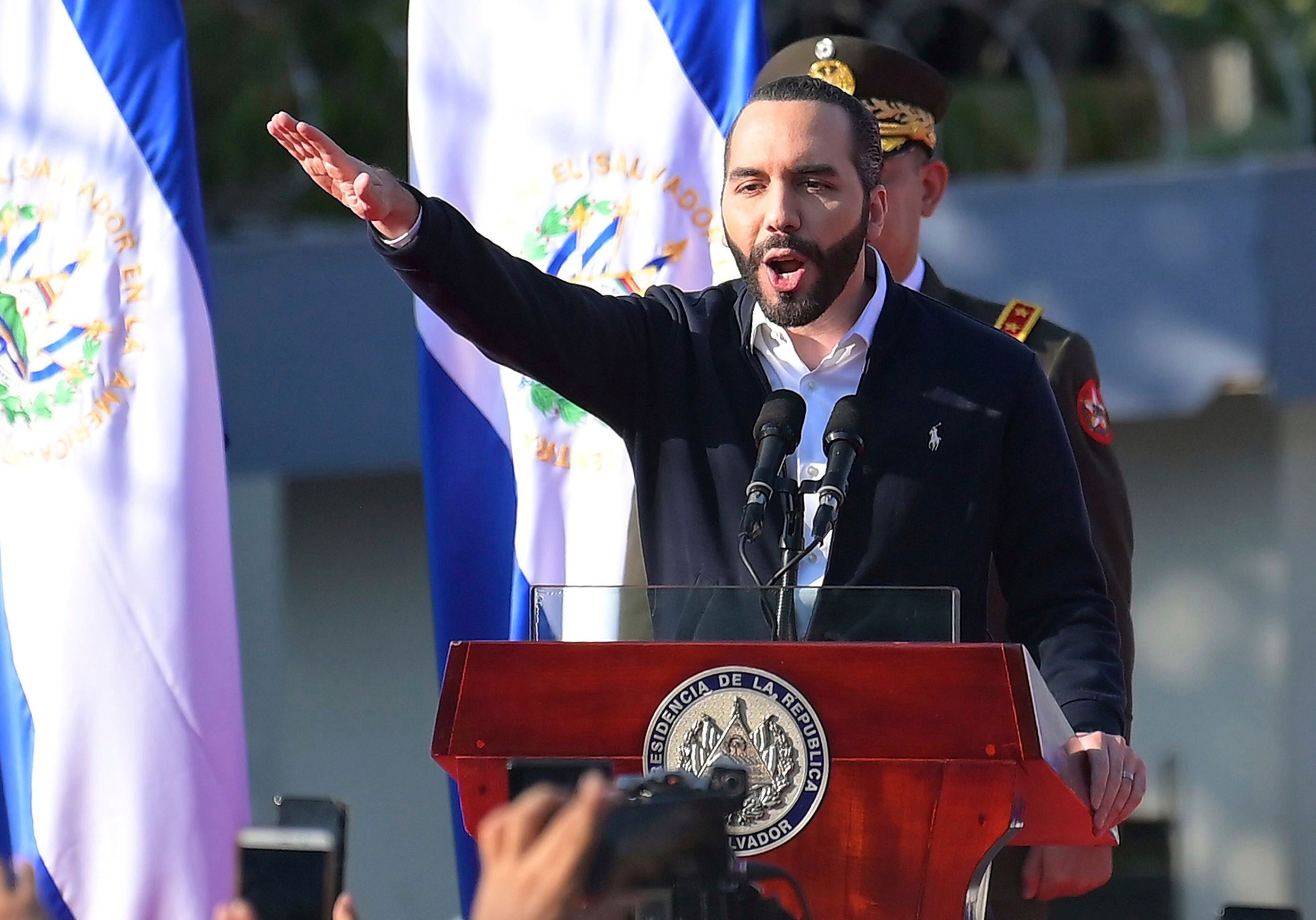The rule of law is disintegrating in Central America
Central American countries are falling like dominoes into authoritarianism.

Nicaraguan president Daniel Ortega has intensified his crackdown on political opponents, journalists and human rights defenders in advance of general elections on November 7. He has detained seven opposition presidential candidates on trumped up charges in an attempt to secure a fourth consecutive presidential term. No less concerning is the fact that most of Nicaragua’s neighbours are following a similar path. Ortega has been able to suppress dissent and restrict political participation in Nicaragua partly because, since he was elected in 2007, he has taken control of all branches of government. Now leaders in El Salvador, Guatemala and Honduras have begun co-opting their countries’ justice systems and eliminating the few fragile checks on their power. Urgent action is required to protect the rule of law before it disintegrates throughout Central America. President Nayib Bukele of El Salvador has used his supermajority in the legislature to bend the justice system to his will. In May, legislators from Bukele’s party summarily replaced all the judges on the country’s constitutional court.
The newly named judges voted in September to let Bukele seek a second term in office, despite a constitutional prohibition on re-election. Bukele’s supporters in the legislature also installed a new attorney general, who quickly ended cooperation with an international commission investigating senior government officials for corruption.
They passed two laws giving the attorney general and Supreme Court, which Bukele has packed, broad power to oust any judge or prosecutor 60 or older. Over 100 judges have been ousted. In Honduras, where elections are scheduled for November 28, President Juan Orlando Hernández - accused by US prosecutors of working with drug trafficking organisations - and his party have likewise been working to take over the justice system. In 2012, legislators packed the Supreme Court with new judges, who changed the constitution in 2015 to allow Hernández to serve a second term.
The new Supreme Court dissolved the Judiciary Council in 2016, giving the court’s head power to appoint and dismiss all the country’s judges. Guatemalan president Alejandro Giammattei and his coalition, which controls Congress, are working to remove the last few independent judges and replace them with allies in an apparent effort to halt an anti-corruption drive that has implicated senior politicians.
They have blocked the appointment of nearly all judges with links to this drive. In July, the attorney general removed the head of the special prosecutor’s office that was investigating Giammattei and other high-level officials for corruption. Now that office could soon be eliminated altogether. Mexico could have stepped up as a regional leader in response to these crises. Instead, President Andrés Manuel López Obrador’s government criticised other countries in the Americas for intervening in Nicaragua’s affairs and for failing to respect “the normal development of democratic institutions”, even as Ortega destroys them.
The Mexican president has not only kept silent about the power grabs in El Salvador, Honduras and Guatemala, but shown little regard for the rule of law and judicial independence at home. While he has not gone to the same lengths as Central American leaders, López Obrador has railed against independent checks on his power and called for punishing judges who rule against him. His supporters in Congress have fiddled with the makeup of the Supreme Court and the Federal Judiciary Council to keep judges they view as allies in control of the justice system. The US, EU and UK have taken some important steps to defend the rule of law in Central America, including freezing assets and suspending visas for individuals linked to abuses. But they can and should do more.
They should put additional pressure on the Ortega regime and call on the UN Security Council to discuss the crackdown in Nicaragua. They should send a clear message that they will not be allies to governments that do not respect judicial independence, and that continuing attacks on the courts will carry consequences, including if necessary the suspension of military aid.
They also need to rally multilateral pressure, starting with like-minded governments in Latin America.
The growing list of political opponents sitting in Nicaraguan jails should serve as a warning for what happens when the rule of law is allowed to disintegrate.
The full dismantling of democratic institutions often takes time. Supporters of democracy and human rights must do their utmost to stop it now before it’s too late. .
Read the full article at the original website
References:
- https://nam02.safelinks.protection.outlook.com/?url=https%3A%2F%2Fwww.nytimes.com%2F2021%2F06%2F09%2Fworld%2Famericas%2Fnicaragua-ortega-opposition-leaders.html%3Fsmid%3Dtw-share&data=04%7C01%7Cvivancj%40hrw.org%7C96c474937c2f4ad2f57608d992e31a11%7C2eb79de4d8044273a6e64b3188855f66%7C0%7C0%7C637702327430523582%7CUnknown%7CTWFpbGZsb3d8eyJWIjoiMC4wLjAwMDAiLCJQIjoiV2luMzIiLCJBTiI6Ik1haWwiLCJXVCI6Mn0%3D%7C3000&sdata=mnRmbNTZK98vRt2YeBqZx4IDqPwt5FYQpS0FtB40lvs%3D&reserved=0
- https://nam02.safelinks.protection.outlook.com/?url=https%3A%2F%2Fedition.cnn.com%2F2021%2F06%2F21%2Famericas%2Fnicaragua-fifth-candidate-detained-intl%2Findex.html&data=04%7C01%7Cvivancj%40hrw.org%7C96c474937c2f4ad2f57608d992e31a11%7C2eb79de4d8044273a6e64b3188855f66%7C0%7C0%7C637702327430523582%7CUnknown%7CTWFpbGZsb3d8eyJWIjoiMC4wLjAwMDAiLCJQIjoiV2luMzIiLCJBTiI6Ik1haWwiLCJXVCI6Mn0%3D%7C3000&sdata=lklt76itQr7LOQyhyrGQQKspGxGMwy%2BTJnIq0kmLpks%3D&reserved=0
- https://nam02.safelinks.protection.outlook.com/?url=https%3A%2F%2Fwww.ft.com%2Fcontent%2Fe59496a6-a844-425c-85ed-98341a26093e&data=04%7C01%7Cvivancj%40hrw.org%7C96c474937c2f4ad2f57608d992e31a11%7C2eb79de4d8044273a6e64b3188855f66%7C0%7C0%7C637702327430533569%7CUnknown%7CTWFpbGZsb3d8eyJWIjoiMC4wLjAwMDAiLCJQIjoiV2luMzIiLCJBTiI6Ik1haWwiLCJXVCI6Mn0%3D%7C3000&sdata=rJdiJFdqnOdJRNX%2FC%2F7E69PAOefQ9vpaejPgIwCxAqs%3D&reserved=0
- https://nam02.safelinks.protection.outlook.com/?url=https%3A%2F%2Fapnews.com%2Farticle%2Fel-salvador-79cf13ad73289bca46e5c8a98410e05c&data=04%7C01%7Cvivancj%40hrw.org%7C96c474937c2f4ad2f57608d992e31a11%7C2eb79de4d8044273a6e64b3188855f66%7C0%7C0%7C637702327430543563%7CUnknown%7CTWFpbGZsb3d8eyJWIjoiMC4wLjAwMDAiLCJQIjoiV2luMzIiLCJBTiI6Ik1haWwiLCJXVCI6Mn0%3D%7C3000&sdata=kCIF0wyCpg9QDgbjQfmfAz79JzRpbSo0O7wDvUcXJK4%3D&reserved=0
- https://nam02.safelinks.protection.outlook.com/?url=https%3A%2F%2Fwww.hrw.org%2Fnews%2F2021%2F09%2F02%2Fel-salvador-new-laws-threaten-judicial-independence&data=04%7C01%7Cvivancj%40hrw.org%7C96c474937c2f4ad2f57608d992e31a11%7C2eb79de4d8044273a6e64b3188855f66%7C0%7C0%7C637702327430543563%7CUnknown%7CTWFpbGZsb3d8eyJWIjoiMC4wLjAwMDAiLCJQIjoiV2luMzIiLCJBTiI6Ik1haWwiLCJXVCI6Mn0%3D%7C3000&sdata=VZQbOylKbqyJDylv9%2BdJ3wkM54blfcCTEK7Bs%2Fzl%2Btw%3D&reserved=0
- https://nam02.safelinks.protection.outlook.com/?url=https%3A%2F%2Fwww.theguardian.com%2Fworld%2F2021%2Fmar%2F11%2Fhonduras-president-juan-orlando-hernandez-drug-trafficker-bribe-testimony&data=04%7C01%7Cvivancj%40hrw.org%7C96c474937c2f4ad2f57608d992e31a11%7C2eb79de4d8044273a6e64b3188855f66%7C0%7C0%7C637702327430553558%7CUnknown%7CTWFpbGZsb3d8eyJWIjoiMC4wLjAwMDAiLCJQIjoiV2luMzIiLCJBTiI6Ik1haWwiLCJXVCI6Mn0%3D%7C3000&sdata=vROskHcMK9hhmJ8ZkFwnfFZq9YPXY51GNSPZ%2Fb11e54%3D&reserved=0
- https://nam02.safelinks.protection.outlook.com/?url=https%3A%2F%2Fnews.un.org%2Fen%2Fstory%2F2013%2F01%2F430832-dismissal-honduran-supreme-court-judges-attack-democracy-un-expert&data=04%7C01%7Cvivancj%40hrw.org%7C96c474937c2f4ad2f57608d992e31a11%7C2eb79de4d8044273a6e64b3188855f66%7C0%7C0%7C637702327430553558%7CUnknown%7CTWFpbGZsb3d8eyJWIjoiMC4wLjAwMDAiLCJQIjoiV2luMzIiLCJBTiI6Ik1haWwiLCJXVCI6Mn0%3D%7C3000&sdata=vs5lKTW1st6%2F%2BvTMDq8VAS%2BS5d1gAqcstGk%2B272bT3k%3D&reserved=0
- https://nam02.safelinks.protection.outlook.com/?url=https%3A%2F%2Felpais.com%2Finternacional%2F2015%2F04%2F24%2Factualidad%2F1429839601_867027.html&data=04%7C01%7Cvivancj%40hrw.org%7C96c474937c2f4ad2f57608d992e31a11%7C2eb79de4d8044273a6e64b3188855f66%7C0%7C0%7C637702327430563561%7CUnknown%7CTWFpbGZsb3d8eyJWIjoiMC4wLjAwMDAiLCJQIjoiV2luMzIiLCJBTiI6Ik1haWwiLCJXVCI6Mn0%3D%7C3000&sdata=zz1syCwpiR02IwyuqW3ff4drubKqodeez4k4m8L7ar4%3D&reserved=0
- https://nam02.safelinks.protection.outlook.com/?url=https%3A%2F%2Freliefweb.int%2Fsites%2Freliefweb.int%2Ffiles%2Fresources%2FA_HRC_44_47_Add.2_E.pdf&data=04%7C01%7Cvivancj%40hrw.org%7C96c474937c2f4ad2f57608d992e31a11%7C2eb79de4d8044273a6e64b3188855f66%7C0%7C0%7C637702327430563561%7CUnknown%7CTWFpbGZsb3d8eyJWIjoiMC4wLjAwMDAiLCJQIjoiV2luMzIiLCJBTiI6Ik1haWwiLCJXVCI6Mn0%3D%7C3000&sdata=IKwLFtN3dqvQPuR6zPFcXy3vHaFJlyYANAhno0hCIUg%3D&reserved=0
- https://nam02.safelinks.protection.outlook.com/?url=https%3A%2F%2Fwww.hrw.org%2Fnews%2F2020%2F11%2F17%2Fguatemala-congress-assaulting-judicial-independence&data=04%7C01%7Cvivancj%40hrw.org%7C96c474937c2f4ad2f57608d992e31a11%7C2eb79de4d8044273a6e64b3188855f66%7C0%7C0%7C637702327430573555%7CUnknown%7CTWFpbGZsb3d8eyJWIjoiMC4wLjAwMDAiLCJQIjoiV2luMzIiLCJBTiI6Ik1haWwiLCJXVCI6Mn0%3D%7C3000&sdata=PHITEd2GukIucSMyWf%2BXZsacsLOON5ShyO7qiSm%2FBwA%3D&reserved=0
- https://nam02.safelinks.protection.outlook.com/?url=https%3A%2F%2Fwww.reuters.com%2Fworld%2Famericas%2Fguatemalan-refuses-appoint-graft-fighting-top-judge-2021-04-14%2F&data=04%7C01%7Cvivancj%40hrw.org%7C96c474937c2f4ad2f57608d992e31a11%7C2eb79de4d8044273a6e64b3188855f66%7C0%7C0%7C637702327430573555%7CUnknown%7CTWFpbGZsb3d8eyJWIjoiMC4wLjAwMDAiLCJQIjoiV2luMzIiLCJBTiI6Ik1haWwiLCJXVCI6Mn0%3D%7C3000&sdata=tjBwSqu8ZfdrdwpW7J1f%2FOCiJ%2BIeOIGF44liYX7VSFg%3D&reserved=0
- https://nam02.safelinks.protection.outlook.com/?url=https%3A%2F%2Fwww.plazapublica.com.gt%2Fcontent%2Fsin-tecnicismos-el-problema-legal-entre-la-cc-y-el-congreso&data=04%7C01%7Cvivancj%40hrw.org%7C96c474937c2f4ad2f57608d992e31a11%7C2eb79de4d8044273a6e64b3188855f66%7C0%7C0%7C637702327430583552%7CUnknown%7CTWFpbGZsb3d8eyJWIjoiMC4wLjAwMDAiLCJQIjoiV2luMzIiLCJBTiI6Ik1haWwiLCJXVCI6Mn0%3D%7C3000&sdata=TGKBLwKFLrOECPn48UXqQyEJevfOiXNgF2M6yZwx4Fw%3D&reserved=0
- https://nam02.safelinks.protection.outlook.com/?url=https%3A%2F%2Felpais.com%2Finternacional%2F2016%2F01%2F28%2Famerica%2F1453944474_095392.html&data=04%7C01%7Cvivancj%40hrw.org%7C96c474937c2f4ad2f57608d992e31a11%7C2eb79de4d8044273a6e64b3188855f66%7C0%7C0%7C637702327430583552%7CUnknown%7CTWFpbGZsb3d8eyJWIjoiMC4wLjAwMDAiLCJQIjoiV2luMzIiLCJBTiI6Ik1haWwiLCJXVCI6Mn0%3D%7C3000&sdata=MgQqf00HgO%2F5P%2Ff2Cjcs80QyQU1aoJClLzBQN3L%2Fo90%3D&reserved=0
- https://nam02.safelinks.protection.outlook.com/?url=https%3A%2F%2Felperiodico.com.gt%2Fnoticias%2Finvestigacion%2F2021%2F05%2F04%2Flos-magistrados-del-pacto-de-corruptos0-1%2F&data=04%7C01%7Cvivancj%40hrw.org%7C96c474937c2f4ad2f57608d992e31a11%7C2eb79de4d8044273a6e64b3188855f66%7C0%7C0%7C637702327430593539%7CUnknown%7CTWFpbGZsb3d8eyJWIjoiMC4wLjAwMDAiLCJQIjoiV2luMzIiLCJBTiI6Ik1haWwiLCJXVCI6Mn0%3D%7C3000&sdata=6otcH%2BC4AcSL4sVCOFBO1SPDr2Znyjbf0482khHlqDM%3D&reserved=0
- https://nam02.safelinks.protection.outlook.com/?url=http%3A%2F%2Fwww.dplf.org%2Fes%2Fnews%2Forganizaciones-internacionales-rechazamos-la-destitucion-del-fiscal-juan-francisco-sandoval-del&data=04%7C01%7Cvivancj%40hrw.org%7C96c474937c2f4ad2f57608d992e31a11%7C2eb79de4d8044273a6e64b3188855f66%7C0%7C0%7C637702327430593539%7CUnknown%7CTWFpbGZsb3d8eyJWIjoiMC4wLjAwMDAiLCJQIjoiV2luMzIiLCJBTiI6Ik1haWwiLCJXVCI6Mn0%3D%7C3000&sdata=jmzALv4EfUkiwPs6loQ%2Fzfg2cjOU3SPU8ILyQHy6RgQ%3D&reserved=0
- https://nam02.safelinks.protection.outlook.com/?url=https%3A%2F%2Fwww.gob.mx%2Fsre%2Fprensa%2Fcomunicado-conjunto-de-mexico-y-argentina-en-la-oea-sobre-la-situacion-actual-en-nicaragua%3Fstate%3Dpublished&data=04%7C01%7Cvivancj%40hrw.org%7C96c474937c2f4ad2f57608d992e31a11%7C2eb79de4d8044273a6e64b3188855f66%7C0%7C0%7C637702327430603537%7CUnknown%7CTWFpbGZsb3d8eyJWIjoiMC4wLjAwMDAiLCJQIjoiV2luMzIiLCJBTiI6Ik1haWwiLCJXVCI6Mn0%3D%7C3000&sdata=DRaV4mhvv1rkMymeQjaeQtxbwqHZ%2B3aTmBjeUoeqBlM%3D&reserved=0
- https://nam02.safelinks.protection.outlook.com/?url=https%3A%2F%2Fwww.hrw.org%2Fnews%2F2021%2F01%2F28%2Fmexico-public-accountability-privacy-under-threat&data=04%7C01%7Cvivancj%40hrw.org%7C96c474937c2f4ad2f57608d992e31a11%7C2eb79de4d8044273a6e64b3188855f66%7C0%7C0%7C637702327430603537%7CUnknown%7CTWFpbGZsb3d8eyJWIjoiMC4wLjAwMDAiLCJQIjoiV2luMzIiLCJBTiI6Ik1haWwiLCJXVCI6Mn0%3D%7C3000&sdata=3DZsYouvRtOG8APA5H2jPBQwFjfk8A7MFyQjiA1qXF0%3D&reserved=0
- https://nam02.safelinks.protection.outlook.com/?url=https%3A%2F%2Fwww.eleconomista.com.mx%2Fpolitica%2FAMLO-envia-carta-a-la-SCJN-por-juez-que-freno-la-reforma-electrica-20210315-0030.html&data=04%7C01%7Cvivancj%40hrw.org%7C96c474937c2f4ad2f57608d992e31a11%7C2eb79de4d8044273a6e64b3188855f66%7C0%7C0%7C637702327430613527%7CUnknown%7CTWFpbGZsb3d8eyJWIjoiMC4wLjAwMDAiLCJQIjoiV2luMzIiLCJBTiI6Ik1haWwiLCJXVCI6Mn0%3D%7C3000&sdata=zPRKek%2BuY%2FRE2uXoD2DUyfj4riKsMx8U38IfwclJh6o%3D&reserved=0
- https://nam02.safelinks.protection.outlook.com/?url=https%3A%2F%2Fwww.hrw.org%2Fnews%2F2021%2F04%2F26%2Flopez-obrador-threatens-judicial-independence&data=04%7C01%7Cvivancj%40hrw.org%7C96c474937c2f4ad2f57608d992e31a11%7C2eb79de4d8044273a6e64b3188855f66%7C0%7C0%7C637702327430613527%7CUnknown%7CTWFpbGZsb3d8eyJWIjoiMC4wLjAwMDAiLCJQIjoiV2luMzIiLCJBTiI6Ik1haWwiLCJXVCI6Mn0%3D%7C3000&sdata=v06citSsTyGnUu4WqNgFcNlt9IMzEpS8%2BItzEL%2FKndk%3D&reserved=0
- https://nam02.safelinks.protection.outlook.com/?url=https%3A%2F%2Fthehill.com%2Flatino%2F554829-usaid-redirects-el-salvador-funds-from-government-to-civil-society%3Frl%3D1&data=04%7C01%7Cvivancj%40hrw.org%7C96c474937c2f4ad2f57608d992e31a11%7C2eb79de4d8044273a6e64b3188855f66%7C0%7C0%7C637702327430623522%7CUnknown%7CTWFpbGZsb3d8eyJWIjoiMC4wLjAwMDAiLCJQIjoiV2luMzIiLCJBTiI6Ik1haWwiLCJXVCI6Mn0%3D%7C3000&sdata=akEXzgZR6Ghq1NAxNskF%2B9iH7Tx3Rau1%2Fnls016%2BU5E%3D&reserved=0
- https://nam02.safelinks.protection.outlook.com/?url=https%3A%2F%2Fwww.reuters.com%2Fworld%2Famericas%2Fus-slaps-sanctions-guatemalan-officials-corruption-crackdown-2021-04-26%2F&data=04%7C01%7Cvivancj%40hrw.org%7C96c474937c2f4ad2f57608d992e31a11%7C2eb79de4d8044273a6e64b3188855f66%7C0%7C0%7C637702327430623522%7CUnknown%7CTWFpbGZsb3d8eyJWIjoiMC4wLjAwMDAiLCJQIjoiV2luMzIiLCJBTiI6Ik1haWwiLCJXVCI6Mn0%3D%7C3000&sdata=5q1DuTHbSpyO5k4%2BlOFZKM2W7wI3zrnBrovmYCy4vfg%3D&reserved=0
- https://nam02.safelinks.protection.outlook.com/?url=https%3A%2F%2Fwww.hrw.org%2Fnews%2F2021%2F08%2F05%2Fnew-eu-sanctions-nicaraguan-officials-amid-escalating-crisis&data=04%7C01%7Cvivancj%40hrw.org%7C96c474937c2f4ad2f57608d992e31a11%7C2eb79de4d8044273a6e64b3188855f66%7C0%7C0%7C637702327430633516%7CUnknown%7CTWFpbGZsb3d8eyJWIjoiMC4wLjAwMDAiLCJQIjoiV2luMzIiLCJBTiI6Ik1haWwiLCJXVCI6Mn0%3D%7C3000&sdata=1GAneVs3Bx5quoAhyesChn2QEPuhF5DX06caW%2B9qGSw%3D&reserved=0
- https://nam02.safelinks.protection.outlook.com/?url=https%3A%2F%2Fwww.whitehouse.gov%2Fbriefing-room%2Fstatements-releases%2F2021%2F06%2F07%2Ffact-sheet-u-s-guatemala-cooperation%2F&data=04%7C01%7Cvivancj%40hrw.org%7C96c474937c2f4ad2f57608d992e31a11%7C2eb79de4d8044273a6e64b3188855f66%7C0%7C0%7C637702327430633516%7CUnknown%7CTWFpbGZsb3d8eyJWIjoiMC4wLjAwMDAiLCJQIjoiV2luMzIiLCJBTiI6Ik1haWwiLCJXVCI6Mn0%3D%7C3000&sdata=eTAgm6eI28yzUMLWOIxaBjYMZUOlksVR2htSU2tB%2BUI%3D&reserved=0
- https://nam02.safelinks.protection.outlook.com/?url=https%3A%2F%2Fwww.hrw.org%2Fnews%2F2021%2F08%2F03%2Finternational-pressure-can-help-stop-abuses-nicaragua-and-allow-fair-election&data=04%7C01%7Cvivancj%40hrw.org%7C96c474937c2f4ad2f57608d992e31a11%7C2eb79de4d8044273a6e64b3188855f66%7C0%7C0%7C637702327430643510%7CUnknown%7CTWFpbGZsb3d8eyJWIjoiMC4wLjAwMDAiLCJQIjoiV2luMzIiLCJBTiI6Ik1haWwiLCJXVCI6Mn0%3D%7C3000&sdata=Je49MBJvElI8HCAwPcAmE%2F2s25QbAgvkWSWsKvd5ggE%3D&reserved=0
